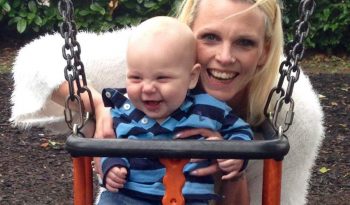This is Dawns story. She wanted to share her story about her experience of Placenta Accreta to help raise awareness and help others who too may have suffered from it.
Please be aware that some stories may trigger difficult memories and emotions so remember your own self-care as everyone will be at different stages of healing.
If you wish to contribute a story, or an experience or something else please contact us.
Thank You
I am a mum to 4… I have two girls & two boys.
This is the pregnancy I want to share my experience about as with this pregnancy I got diagnosed with PLACENTA ACCRETA. Placenta accreta is a serious pregnancy condition that occurs when blood vessels and other parts of the placenta grow too deeply into the uterine wall.
These are the three categories of the condition, although mostly it is all referred to as ACCRETA;
- accreta -the placenta attaches to the muscle of the uterine wall. This type of attachment occurs in approximately 75 to 78% of cases of placenta accreta;
- increta -the placenta extends into the muscles of the uterus. This degree of attachment occurs in approximately 17% of cases, and
- percreta -the placenta extends through the entire wall of the uterus. This deepest form of attachment occurs in approximately 5 to 7% of cases.
Typically, the placenta detaches from the uterine wall after childbirth. With placenta accreta, part or all of the placenta remains firmly attached. This can cause severe blood loss after delivery.
It’s also possible for the placenta to invade the muscles of the uterus (placenta increta) or grow through the uterine wall (placenta percreta).
Placenta accreta is considered a high-risk pregnancy complication. If placenta accreta is suspected during pregnancy, it is likely there will be a need for an early C-section delivery around 37 weeks.
The increase of this condition has been parallel with an increase incidence of cesarean section delivers. Researchers have reported the incidence of placenta accreta as 1 in 533 pregnancies for the period of 1982–2002. This contrasts sharply with previous reports, which ranged from 1 in 4,027 pregnancies in the 1970s, increasing to 1 in 2,510 pregnancies in the 1980s.
This is my personal story, I had two previous c-sections, both with my girls due to preeclampsia, my eldest was born at 34 weeks, so I also understand about having a baby in a special care baby unit.
My third baby was born naturally at 37 weeks although I was booked in for another c-section at 39 weeks, this was arranged due to the two previous ones. I then had a miscarriage, I then tried for a year, had given up hope but then I fell again…. Everything was going fine it had been discussed that I would have a natural birth again, as the previous one went so well. That was until 24 weeks when I had a huge bleed… No pain but huge clots… I was in hospital for 4 days until no sign of bleeding. It was thought it was because of placenta previa & was re-scanned as it was hard to confirm, as they could not find my uterus at all. I was lucky as the consultant looking after me at the time, thought I might benefit from seeing a specialist in accreta because of my past history. I was then rescanned but it was hard to get a firm yes or no, so I went away hoping all would be ok.. The specialist consultant at this point thought everything would be ok but wanted to rescan another 2 weeks later. In the meantime, I was also told I also had gestational diabetes, another condition that was hard to handle as it gets worse as the pregnancy progresses.
Anyway, at my next scan, I was scanned for over an hour & it was confirmed that I had accreta a condition I had never heard of. It was then arranged I would deliver at 37 weeks via a c-section but another plan was also put together so that if I went into labour naturally I would deliver & hopefully leave the placenta in.
Christmas & New Year came and went all ok, I then had another appointment which showed I was fully dilated, I was 33 weeks, so they didn’t want to do anything. I stayed like this for 3 weeks. Then on a Sunday morning, I thought my waters had broken but in fact, it was blood. We called an ambulance as there was so much blood and we were aware of the possibility of haemorrhaging… Within an hour I was all hooked up to machines and monitors due to the diabetes, to replace fluids. I started contracting but stopped as the little one turned back to back. Things didn’t progress very well after that so it was decided to take me to theatre to deliver with forceps and then to assess the situation. Things were happening around me but I couldn’t get my head around what was happening, kind of like it was happening to someone else… Luckily I had an amazing partner who would keep me calm and an anaesthetist who I just trusted and he wasn’t going to let them do anything till I was in no pain.
I delivered after 3 pushes a perfect little man. I did kind of get to hold him but he was taken off me quickly. I then remember the pain, it was hurting a lot basically because a surgeon was pushing down on my stomach but they were also holding me internally as my uterus was not contracting normally to stop the bleeding and I was haemorrhaging. Blood was being used up really quickly. (I had 10 units put up in total throughout the operation) I knew that I was dying … I said goodbye to my partner & my new baby.. Still unsure if I will see them again… I was so scared.
I woke up hours later with no uterus but I was alive.
I was lucky I had a very supportive partner, family and consultant but they had no knowledge of the emotional turmoil I was in. This condition tainted the last few months of my pregnancy as the whole concern was getting through the birth.
I wish by my sharing my experience I will be able to promote awareness of this condition and let women know who have been through this and have delivered but may still be traumatised by what they have been through or the ladies who are going through this now, know they are not alone.
Since the birth I have been diagnosed with Post Traumatic Stress Disorder, I will never be the same again but I will be ok.
Thank you for reading my story.
Dawn Clare Capell


